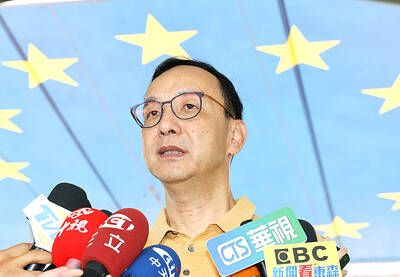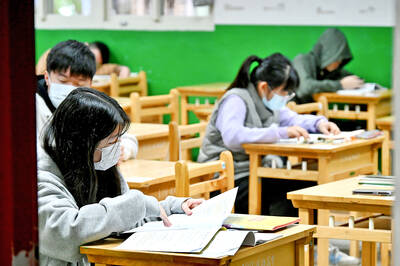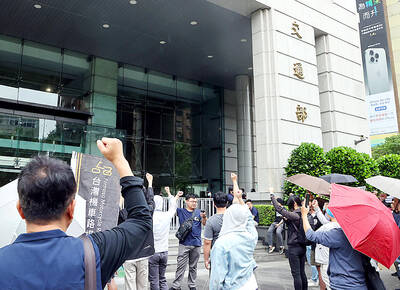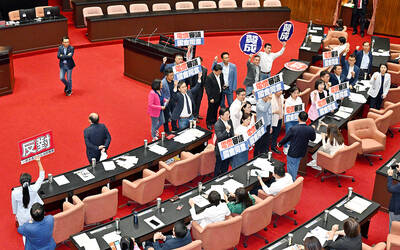The process of demolishing dilapidated buildings in urban areas and reconstructing them is to become much easier as lawmakers passed a third reading of an amendment to the Statute for Expediting Reconstruction of Urban Unsafe and Old Buildings (都市危險及老舊建築物加速重建條例) in a plenary session yesterday.
The amendment stipulates that public property, including land and buildings, must by default be included in urban housing reconstruction projects, unless there are other plans for the reasonable use of that property.
Exceptions are also to be made for housing reconstruction projects in which public properties account for more than 50 percent of the area subject to reconstruction, or in which public properties account for 30 percent of the area subject to reconstruction and the scope of the redevelopment plan complies with government standards.

Photo: CNA
The amendment would speed up the process of tearing down old and unsafe buildings and reconstructing them by exempting the government from adhering to the Land Act (土地法), the National Property Act (國有財產法), the Budget Act (預算法) or the public property regulations of local governments regarding housing reconstruction projects, Minister of the Interior Lin Yu-chang (林右昌) said.
“In the past, if a housing reconstruction project covered an area that involved both the government and private individuals as property owners, the process generally took a long time to complete as any development plan required consent from all owners whose properties were included in the project, and changes to the use of public properties had to be congruent with the Land Act and regulations. This affected the time line when addressing the issues posed by dangerous buildings,” Lin said.
The amendment also gives the government the flexibility to have public properties included in housing reconstruction projects through the construction of new buildings in partnership with other stakeholders, auctions or special sales, Lin said.
If the government decides to construct new buildings together with other stakeholders, it should first hire real-estate appraisers to assess the value of the property before and after reconstruction, and negotiate how to divide the ownership of properties with its building partners after reconstruction is complete, he said, adding that this would ensure that the ownership of public properties is protected.
“We are to meet with officials in the Ministry of Finance and local governments to finalize enforcement details, so that many urban renewal projects can proceed quickly,” Lin said.
Separately, lawmakers approved a third reading of amendments to the Housing Act (住宅法) that expand the availability of public housing to more economically and socially disadvantaged people.
The amendments define “landlords who lease their houses for public welfare purposes” as those who rent to social welfare groups, which then sublet to tenants who qualify for government subsidies for rent.
Leases signed between these landlords and their tenants should not be used as a basis for landlords to incur more income tax, housing tax and land value tax, the amendments state.
To encourage more landlords to lease their houses for public welfare purposes, a monthly comprehensive income tax deduction of up to NT$15,000 per housing unit would be given after the amendments take effect, and the housing tax and land value tax of their leased properties would be the same as for self-use residential properties.
The amendments are to allow economically disadvantaged families raising two underage children to qualify for public housing, down from three underage children in the current regulations.

GOOD DIPLOMACY: The KMT has maintained close contact with representative offices in Taiwan and had extended an invitation to Russia as well, the KMT said The Chinese Nationalist Party (KMT) would “appropriately handle” the fallout from an invitation it had extended to Russia’s representative to Taipei to attend its international banquet last month, KMT Chairman Eric Chu (朱立倫) said yesterday. US and EU representatives in Taiwan boycotted the event, and only later agreed to attend after the KMT rescinded its invitation to the Russian representative. The KMT has maintained long-term close contact with all representative offices and embassies in Taiwan, and had extended the invitation as a practice of good diplomacy, Chu said. “Some EU countries have expressed their opinions of Russia, and the KMT respects that,” he

CHANGES: After-school tutoring periods, extracurricular activities during vacations or after-school study periods must not be used to teach new material, the ministry said The Ministry of Education yesterday announced new rules that would ban giving tests to most elementary and junior-high school students during morning study and afternoon rest periods. The amendments to regulations governing public education at elementary schools and junior high schools are to be implemented on Aug. 1. The revised rules stipulate that schools are forbidden to use after-school tutoring periods, extracurricular activities during summer or winter vacation or after-school study periods to teach new course material. In addition, schools would be prohibited from giving tests or exams to students in grades one to eight during morning study and afternoon break periods, the

Advocates of the rights of motorcycle and scooter riders yesterday protested in front of the Ministry of Transportation and Communications in Taipei, making three demands. They were joined by 30 passenger vehicles, which surrounded the ministry to make three demands related to traffic regulations — that motorcycles and scooters above 250cc be allowed on highways, that all motorcycles and scooters be allowed on inside lanes, and that driver and rider training programs be reformed. The ministry said that it has no plans to allow motorcycles on national highways for the time being, and said that motorcycles would be allowed on the inner

AMENDMENT: Contact with certain individuals in China, Hong Kong and Macau must be reported, and failure to comply could result in a prison sentence, the proposal stated The Chinese Nationalist Party (KMT) and the Taiwan People’s Party (TPP) yesterday voted against a proposed bill by Democratic Progressive Party (DPP) lawmakers that would require elected officials to seek approval before visiting China. DPP Legislator Puma Shen’s (沈伯洋) proposed amendments to the Act Governing Relations Between the People of the Taiwan Area and the Mainland Area (臺灣地區與大陸地區人民關係條例), stipulate that contact with certain individuals in China, Hong Kong and Macau should be reported, while failure to comply would be punishable by prison sentences of up to three years, alongside a fine of NT$10 million (US$309,041). Fifty-six voted with the TPP in opposition